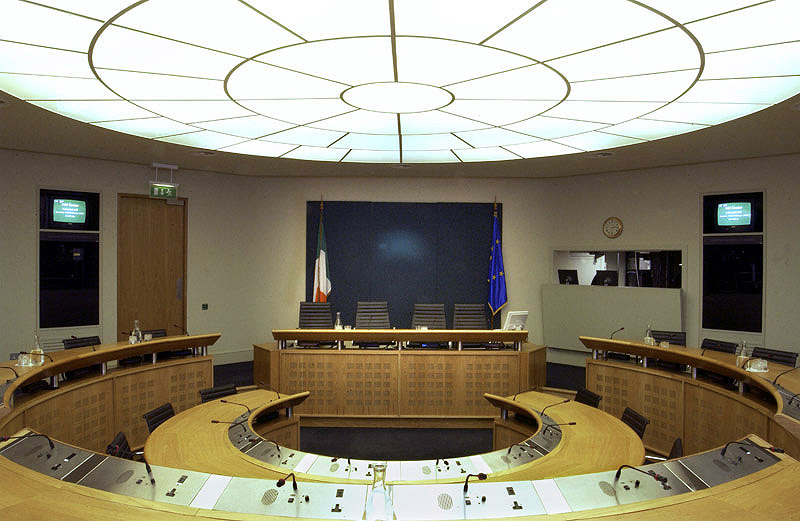Amid concerns about high emigration rates and equality of access, researchers with opposing findings on the feasibility of income-contingent loan schemes for third-level education presented their findings today to the committee charged with considering the future funding of the sector.
The two teams of researchers recently completed research on the feasibility of such schemes and whether or not they could work within the Irish system, with conflicting results. One study, authored by Trinity’s Dr Charles James Larkin and Dublin City University’s (DCU) Dr Shaen Corbet, declared such a scheme to be infeasible due to Ireland’s size, concluding that it would cost the exchequer €10 billion over 12 years. In contrast, the other study, authored by Prof Bruce Chapman, the author of Australia’s income-contingent loan scheme; Dr Darragh Flannery of the University of Limerick; and Dr Aedín Doris of Maynooth University, found such a system to be the cheapest way to finance the expansion of third-level education in Ireland.
Made up of representatives from five political parties, the Education and Skills Committee is currently debating the three options, including a state-funded system and an income-contingent loan scheme, for the future funding of higher education, as the funding crisis for the sector continues.
After both teams outlined their findings, committee members queried how such a scheme could function given Ireland’s high emigration rate and what was classified as a “highly volatile” economy.
Dorris stated that while a fully taxpayer-funded system may seem “attractive” to students, it was ultimately the “most regressive”, given what would be a “continued heavy reliance on the taxpayer”. Income-contingent debt, she stated, is “unlike other forms of debt”, and the other two options outlined in the government report would cost the state more by 2030.
A common concern raised about an income-contingent system is the cost to the public in the initial stages, as upfront income from students would stop and money collected from graduate would take years to come back. However, Dorris stated that increasing higher education funding by €2,000 per student is “costly, no matter how it is done”, but that an income-contingent system would result in a lower cost on the taxpayer. Dorris stated that this system was more equitable, with those who don’t benefit from higher education not involved in its funding. There is “nothing” about an income-contingent loan system that’s “inherently costly” for the government, she stated.
Dorris was critical of the other study, stating that it did not model the cost of any alternatives to an income-contingent loan scheme.
Outlining his study, Larkin focused on Ireland, citing its high dropout rates, tendency for graduates to overestimate their income, the replacement of high-paying jobs with automation and the likelihood of economy and salary shocks. Comparing the situation of a student who leaves Ireland and secures a high-paying job abroad with that of a lower-income graduate who stays in Ireland and slowly repays their loan, Larkin stated that the “complexities need to be worked out in legislation to make such a system work in Ireland”. Corbet added that the system would have to acknowledge that Ireland loses a significant proportion of its best graduates to emigration.
Larkin also queried how much money the system would raise. Even if we look at improving the position of Ireland’s institutions, he stated, this would require “much more money” than an income-contingent loan scheme could provide. He took a holistic view of education, asking those present who they thought was “most important” in the exchange: the student, the institution or the exchequer. There is a danger, he stated, of focusing entirely on recuperating funds rather than looking at the quality of education being offered.
Citing international examples including the US and the UK, Larkin stated the systems were “damaging for equality”, estimating that approximately 50 per cent of graduates will be unable to pay over 20 years. New Zealand, he stated, has had to resort to arresting graduates at airports. Looking at graduates in the UK in 2003, Corbet stated that 57.5 per cent had not repaid the money 13 years later. Citing Brexit, he stated that it would be “disasterous” if an income-contingent loan scheme was to be introduced in this capacity.
Larkin concluded that their research showed an income-contingent loan scheme to be a “risky course of action” in Ireland.
Made up of TDs and senators from Fine Gael, Fianna Fáil, Sinn Féin and the Green Party, as well as Independent Trinity Senator Lynn Ruane, the committee is deliberating between the options of a predominantly state-funded system, the continuation of the current student contribution charge alongside increased state investment and the introduction of such an income-contingent loan system as outlined in the government’s higher education funding working group, known as the Cassells Report.







